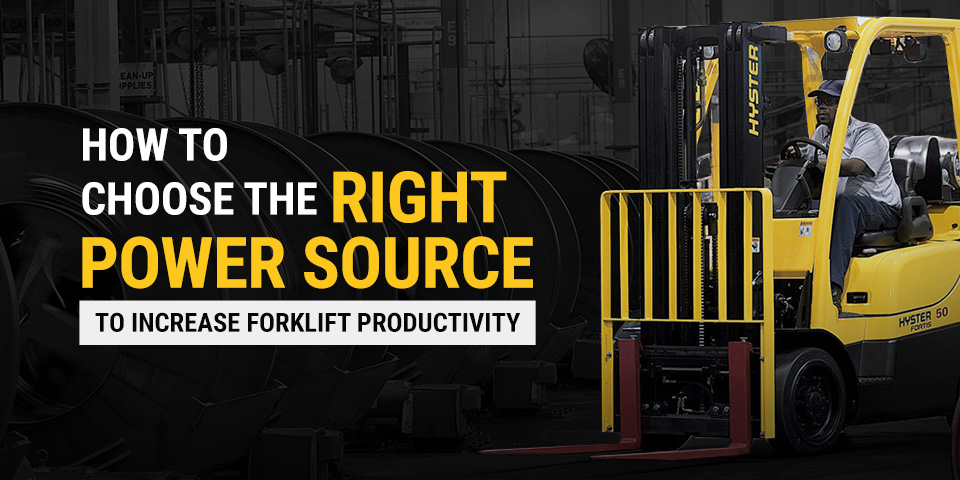
Is it time to assess the power sources used by your forklift fleet? Forklifts can now be powered by an array of energy sources — from batteries to hydrotreated vegetable oil! According to recent industry data by ACS Omega, 69% of shipped forklifts are now electric, while a shrinking proportion — 31% — are powered by an internal combustion engine.
In this guide, you'll learn the differences between multiple fuel sources to decide which suits your operation.
Types of Forklift Power Sources
Forklift power sources fit into electric and internal combustion categories, which allow you to choose more specific options to suit your business.
Electric
According to estimates from the Electric Power Research Institute, energy costs of 5,000-pound capacity electric forklifts are about 1/5 compared to propane-, diesel- or gas-powered models. With fewer moving parts, operational and maintenance costs are nearly half as much as fossil-fuel-powered lifts.
If you decide an electric forklift is right for your business, you'll find them classified by the Occupational Safety and Health Administration (OSHA) as Class I, Class II or Class III according to their capabilities:
- Class I: Electric motor rider trucks
- Class II: Electric motor narrow aisle trucks
- Class III: Electric motor hand trucks or hand/rider trucks
Electric forklifts have three power sources:
- Lithium-ion: These batteries have advanced sustainable power. They offer minimal maintenance, consistent energy in hot and cold environments and a space-saving design.
- Hydrogen fuel cells: With Hydrogen-powered forklifts, you'll get quiet operation and fast refueling in as little as three minutes. The fuel also comes from natural, recyclable resources, making it environmentally friendly.
- Lead acid: This traditional electric power source offers lower startup costs and is a reliable power source with a long record of success. Newer options in this category include thin pure plate lead.
Internal Combustion
Forklifts with internal combustion engines use fuel sources like gasoline, diesel or compressed natural gas. They provide benefits like:
- The ability to work in areas without power grid access
- Small fueling infrastructure to save you space
- A short refueling time to allow for more work
- Longer operating times between refueling
Here's an overview of internal combustion power options:
- Diesel: This power source provides better efficiency and longer run times than other fuel types. It also provides higher torque. One downside is that diesel produces soot that builds up in exhaust systems. Diesel forklifts are also designed for outdoor use due to their noise and higher emissions.
- Gasoline: While gasoline is relatively rare due to the lack of gasoline fuel stations and the popularity of dual-fuel forklifts, this fuel source works well for those with readily available fueling stations. Gasoline forklifts have better rearward visibility without a liquid petroleum (LP) tank and provide more power than diesel.
- Liquid petroleum gas: This fuel source gives the lowest initial cost because you only need to purchase tanks and storage. The fuel tanks work on indoor and outdoor forklifts and can be swapped in minutes.
- Compressed natural gas (CNG): The main benefits of CNG are its lower emissions and speed of refueling since the tank can be refilled rather than removed like LP tanks. The disadvantages are the expensive infrastructure for CNG refueling, inadequate CNG supply and the need to obtain proper permits.
Deciding Between Electric vs. Fossil-Fuel-Powered Forklifts
While there are many power options available, you should weigh the pros and cons based on your organization's needs. Internal combustion and electric are the two main categories of lifts you'll find — additionally, a few emerging technologies like hydrogen fuel cells and hybrid forklifts are on the market. Some considerations you'll need to make include the initial cost, run time, emissions and noise.
Here are a few advantages, disadvantages and considerations to factor in.
Advantages and Disadvantages of Forklift Power Sources
| Power Source | Advantages | Disadvantages |
| Internal combustion engine (ICE) | Power, long running time | Produces emissions, can be noisy |
| Electric | Quiet, zero emissions | Shorter runtime, must be recharged periodically |
| Hydrogen fuel cell | Zero emissions, quick refueling | New technology, may be more expensive than traditional ICE or electric forklifts |
| Hybrid | Combines benefits of electric and ICE power sources | May be more expensive than ICE or electric forklifts |
Key Factors to Consider Before Purchase
Here are a few points to consider when making your forklift purchase.
Operational Cost
Some factors that influence operational costs include:
Working Environment
Consider how extreme temperatures impact forklift operations. For any piece of equipment, extremely low-temperature environments can decrease efficiency. Combustion forklifts typically perform better on a broader temperature range.
Facility Space
In some warehouses, every square foot matters. Electric forklifts typically require more room for charging infrastructure, although newer models need less space. Combustion models can accommodate storing fuel outdoors, freeing up more room for your operations. Calculate how much space you'll need and if this will decrease your storage inventory.
Operator Training
Much of the success of implementing a particular forklift depends on the people who operate it. Those businesses focusing on optimizing forklift efficiency will get significant value for their investment. Due to their charging requirements, electric forklifts often need more care for better performance.
Environmental Cost
Here are the main points to keep in mind concerning your forklift's environmental cost.
Emissions
When operating in an enclosed warehouse environment, you may need to watch emissions closely. Specific industries like food or medicine must meet strict requirements for clean air. Your business may also hold particular standards to meet sustainability goals. Electric forklifts often prove the best choice for low-emissions environments.
Electricity Access
Whether you're off the grid or interested in reducing your utility costs, you may seek a forklift model that can run without electricity. In these scenarios, internal combustion engines work best. Some businesses have electrical access that comes with high costs. Calculate how much you pay for power and incorporate this into your operation expenses.
Initial Cost
Electric-run forklifts often have a higher price point for initial purchase than combustion engine models. Within the category of electric forklifts, you may see some price variation. Newer technologies like hydrogen fuel cells might be more expensive than options like lithium-ion.
Refueling Cost
With electric forklifts, you pay the refueling cost through your electric bill. Typically, your prices will be much lower than filling combustion-powered equipment. Depending on the fuel source, you may pay more or less, with diesel often incurring the highest refueling costs.
Maintenance Costs
Due to fewer moving parts and fluids, electric forklifts often have lower maintenance requirements. No matter which forklift you choose, you will have some maintenance expenses. However, specific models will allow you to operate for longer without maintenance. When considering maintenance costs, also account for any expenses from lost operation time.
Downtime
If your operation runs day and night, you want your equipment to maintain that pace. Electric forklifts typically require extended downtime to charge, making them a better choice for light-duty or single-shift applications. For businesses seeking the least downtime with an electric model, hydrogen cells are the ideal choice.
Explore LiftOne's Line of Electric and ICE Powered Forklifts
At LiftOne, we offer a range of electric and combustion forklifts from top brands. Whether you want an electric or diesel forklift, you'll find new, used or rental options that increase productivity and benefit your bottom line. Reach out to our team online to discuss your equipment needs today.










